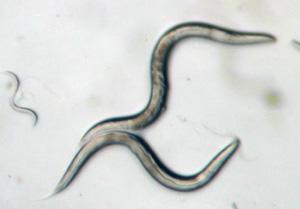Men, deep circles and people may have similar aging mechanisms
Scientists at the University of Washington and other institutions have found 25 genes that regulate life expectancy in two species that have evolutionary differences of up to 1.5 billion years. At least 15 of these genes have similar structures in humans. This suggests that scientists can focus on these genes to find ways to slow the aging process and cure aging diseases.
The two organisms used in this study, the newly developed single-celled yeast and C. elengans, are often used in aging research. Finding the genes maintained in both species is significant, scientists said, because the two species are far apart in the evolutionary scheme - even further than the link. The system of small worms with humans. This, along with similar human genes, is a sign that these genes may also regulate human life.
Brian Kennedy, a UW biochemist and one of the study's authors, said: 'Now that we know exactly which genes are, we can target our research on people. . We hope that in the future we can influence those target genes and improve not only lifespan, but also the period of time when a person is healthy and does not have to suffer from old age diseases. ' .

Round depth C. elegans. First, the scientists found 276 genes in C. elegans that affect aging, and they found the same gene sequence in yeast. Of the 25 aging-related genes they found in round worms and yeast, only three were thought to be sustained through many organisms. (Photo: Image courtesy of NASA)
Some genes that scientists have determined to play a major role in the aging process, are also linked to an important nutrient reaction called the Goal of Rapamycin, or TOR. This finding adds further evidence to the theory that calorie intake and nutrient response affect life expectancy by altering TOR activity. Previous studies have found that severely limiting the amount of calories absorbed in living organisms, a method known as a diet, can prolong life and reduce the incidence of old age diseases. TOR inhibitors have been clinically tested in humans to fight cancer, and this suggests they may be useful for age-related diseases.
'The last thing we want to do is create efficiency like dieting with a drug,' said Matt Kaeberlein, another author of the article and UW professor of pathology. 'Most people don't want to reduce their diet too much so they can live a little longer. But someday in the future, we might be able to do this with a drug. '
These discoveries also give a new insight into the genetics of aging, scientists added, and provide some of the first evidence of age-specific genes that are maintained through the process. evolution. Previous evolutionary theories suggest that aging is not genetically controlled, because an organism does not have any advantage in natural selection with a long life span beyond the time of birth.
To find these age-controlling genes, scientists have taken a genetic approach to test all the genes that affect aging in the enamel and the deep. Based on published reports, they first found 276 genes in C.elegans that affected aging, and then continued searching for the same gene sequence in yeast. Of the 25 aging-related genes they found in round worms and yeast, only three were thought to be sustained through many organisms.
Reference: Smith, ED, Tsuchiya, M., Fox, LA, Dang, N., Hu, D., Kerr, EO, Johnston, ED, Tchao, BN, Pak, DN, Welton, KL, Promislow., DEL , Thomas, JH, Kaeberlein, M., and Kennedy, BK Evidence of similar aging between divergent eukaryotic species.Genome Res.doi: 10.1101 / gr.074724.107.
- Why stay up late or get dark?
- Detects compounds in vegetables and chemotherapy drugs that slow down aging
- Mother's gene affects the aging process of children
- Sent deep into the universe to study the medicine of immortality
- Close-up of the spiders' abnormal self-defense mechanism
- Video: Mysterious circle on the field in Germany
- For the first time in history, the aging process can be reversed, helping young people never grow old
- The secret of the longest living species of the planet
- Depressed people age faster
- Oxidation - aging eyes
- A series of 'hearing is nausea' defense mechanisms of animals
- Decode the fairy circles in Danish waters
 Green tea cleans teeth better than mouthwash?
Green tea cleans teeth better than mouthwash? Death kiss: This is why you should not let anyone kiss your baby's lips
Death kiss: This is why you should not let anyone kiss your baby's lips What is salmonellosis?
What is salmonellosis? Caution should be exercised when using aloe vera through eating and drinking
Caution should be exercised when using aloe vera through eating and drinking Tomatoes will be sweeter and juicier thanks to new technique
Tomatoes will be sweeter and juicier thanks to new technique  Discovered many types of bacteria containing antibiotic resistance genes in Antarctica
Discovered many types of bacteria containing antibiotic resistance genes in Antarctica  The strange evolution of carnivorous plants
The strange evolution of carnivorous plants  Science proves that smart children are mainly thanks to their mothers
Science proves that smart children are mainly thanks to their mothers  Are we more like father or mother?
Are we more like father or mother?  Who wears glasses is smarter than others?
Who wears glasses is smarter than others? 